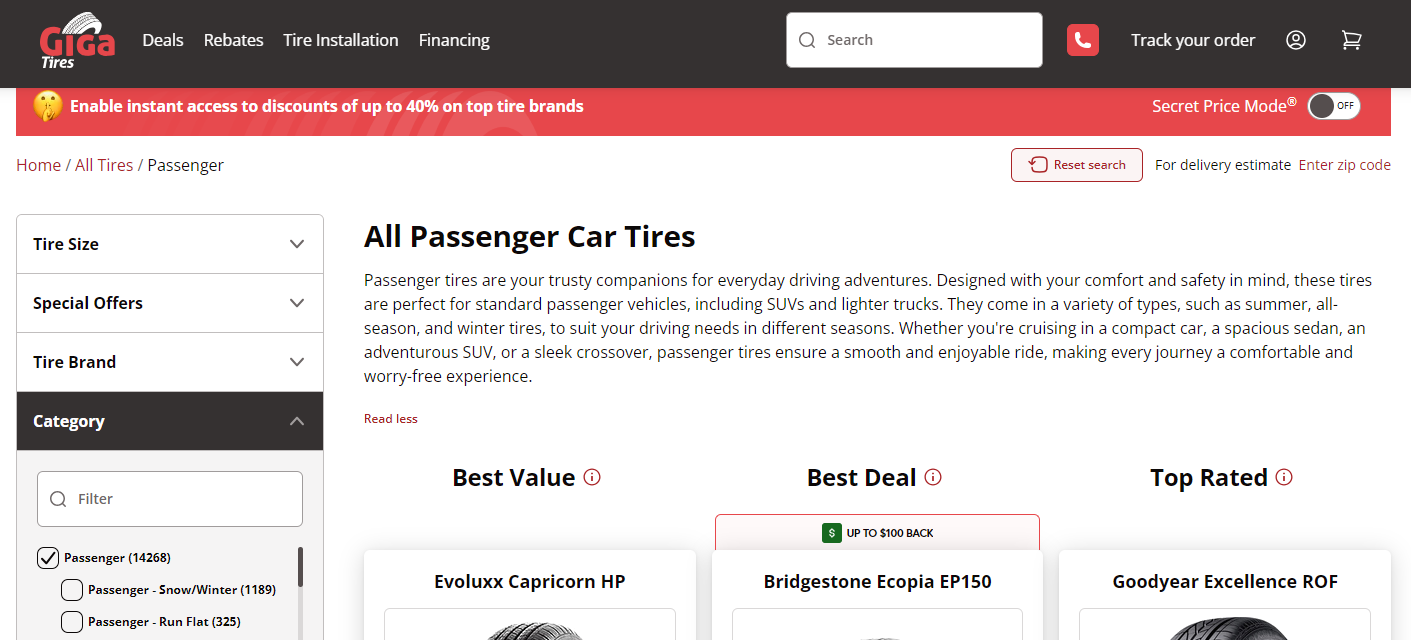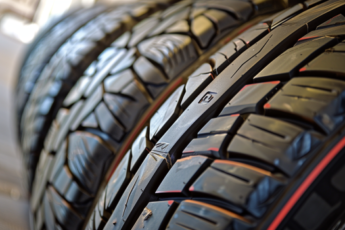Last Updated on 1 week
Navigating Through Seasons: Unveiling the Best All-Weather Tires for Passenger Vehicles
As a dedicated driver and consumer advocate, my commitment to your road safety has led me through countless tires. Yet, nothing brings me more confidence than discovering the best all-weather tires for Passenger vehicles. These are the unsung heroes for those of us sharing a bond with our cars, transcending climates and seasons with unparalleled grit. Think of them as your vehicle’s most versatile allies, earning Passenger vehicle all-season tire ratings that signify durability and performance in a single, unified package. In this ongoing quest, it has been my pleasure to witness the rise of top all-weather tire brands, each promising to keep you safe and steady, regardless of the weather’s whims.
Key Takeaways
- All-Season Versatility: Find tires that conquer multiple weather conditions, ensuring year-round reliability.
- Rigorous Tire Testing: Trust in tire ratings, reflecting comprehensive evaluations on performance and safety.
- Brand Trust: Rely on well-established tire brands recognized for quality and endurance in diverse climates.
- Performance Balance: Choose tires that achieve harmony between handling, durability, and comfort.
- Consumer Confidence: Listen to fellow drivers’ experiences and testimonials for real-world insights.
- Technological Advancement: Look for innovative features in new tire models that enhance driving under various conditions.
- Smart Shopping: Learn to navigate online purchasing for convenient, well-informed tire shopping with peace of mind.
Why All Weather Tires Are Essential for Passenger Vehicles
In my journey to uncover the most reliable tires for every season, I’ve come to appreciate the critical need for all-weather tires in passenger vehicles. This necessity stems from the comprehensive capability of these tires to perform admirably across diverse weather patterns. Whether I’m facing the fierce heat of summer roads or the unpredictable sleet of early spring, a robust set of all-weather tires has continuously proven indispensable.
Understanding the Versatility of All-Weather Tires
The allure of all-weather tires is evident in their name—they are built for all weather. Unlike seasonal tire alternatives, these unique tires blend the summer tire’s prowess for wet and dry roads with the winter tire’s tenacity against snow and ice. Engaging in a thorough all-weather tire comparison has shown me that these tires are not just a compromise; rather, they stand as a testament to engineering ingenuity, providing comfort and control in temperature extremes and unpredictable weather.
The Importance of Tire Durability and Performance in Various Conditions
My confidence in all-weather tires strengthens with each driving experience, as they consistently showcase superior durability. Extreme temperature fluctuations and varying road surfaces demand a tire that can endure without sacrificing performance. This is why I rigorously seek out Passenger car all-weather tire reviews before making a selection. The collective wisdom shared in these reviews often sheds light on a tire’s life span, grip, and adaptability, ensuring that I recommend only tires that rise to the challenges of year-round driving.
Key Factors in Selecting the Right All-Weather Tires
When the time comes to equip your vehicle with new tires, the selection process goes beyond just the price tag. As an informed driver, I consider a multitude of factors that contribute to the safety, efficiency, and overall performance of all-weather tires. Key among these factors are Passenger vehicle all-season tire ratings and tread patterns, elements that can drastically alter your driving experience.
Tire Ratings and What They Mean for Performance
Tire ratings are quintessential in guiding my decisions, as they provide a snapshot of a tire’s capabilities. The Passenger vehicle all-season tire ratings encapsulate crucial performance parameters such as traction, temperature resistance, and treadwear. These metrics are pivotal as they indicate how a tire would likely respond to different driving conditions, from wet pavements to scorching highways.
- Traction: Indicates the tire’s grip, crucial for ensuring stability during emergency maneuvers and on slippery surfaces.
- Temperature Resistance: Reveals how well the tire can perform in various climate extremes without compromising structural integrity.
- Treadwear: Offers an estimation of tire longevity based on standardized testing, helping to forecast the possible mileage before replacement.
Tread Patterns and Their Impact on Vehicle Handling
Next to ratings, the tread pattern emerges as a vital criterion. It’s not just a tire’s skin; it’s the core of contact with the road. The intricacies of the tread design directly affect vehicle handling, influencing both wet and dry performance. A thoughtfully designed tread pattern promises reduced road noise and heightened comfort, positively impacting my driving experience.
| Tread Pattern Characteristics | Impact on Performance |
|---|---|
| Wide Grooves | Enhances water evacuation, reducing hydroplaning risk. |
| Siping | Improves grip on ice and snow by creating additional biting edges. |
| Blocky Design | Increases traction on loose surfaces like gravel or mud. |
| Asymmetrical Patterns | Optimizes variable zones for different performances, such as dry handling and wet grip. |
Being mindful of these factors leads me towards a collection of top-rated all-season tires that ensure not just mobility but also peace of mind, regardless of what Mother Nature has in store. Choosing the correct all-season tire is an investment in the vehicle’s future and, more importantly, in my safety on the road.
Advanced Features of the Best All-Weather Tires for Performance
Seeking out the best all-weather tires for performance, my focus always narrows to their advanced features, which are truly the game changers. Understanding that a tire must be more than just adaptable, I’ve delved into the technological nuances that set superior tires apart. These advancements don’t just confront the challenges presented by varying weather—they rise above them, providing unwavering confidence behind the wheel.
Take, for instance, the innovative tread compounds that these high-performing all-weather tires employ. Crafted to stay flexible when temperatures plummet and remain robust under summer’s scorch amid searing asphalt—these compounds exhibit a resilience that’s nothing short of impressive. There’s a sense of reassurance, knowing that my tires can tackle a January freeze and a July heatwave with equal aplomb.
Another key feature is the tire’s structural reinforcement, which isn’t always visible to the naked eye but palpable in the tire’s performance. Reinforced sidewalls contribute to this, offering a tire that can not only support the vehicle’s weight but adapt seamlessly to quick changes in direction or emergencies. It’s like having an invisible co-pilot, dedicated to maintaining stability no matter what lies on the road ahead.
- Adaptive Siping Techniques: These clever grooves in the tires open up in the snow for improved traction yet lock together on dry roads for better handling.
- Layered Tread Elements: Multiple layers work consecutively to provide grip as the tire wears, ensuring lasting performance.
- Heat-Dispersion Technology: This feature deftly manages tire temperatures, reducing the risk of blowouts during extended highway travel.
Here’s a comparative look at how these features stack up:
| Feature | Benefit | Driving Condition |
|---|---|---|
| Innovative Tread Compounds | Year-round flexibility and durability | Extreme temperatures, wet/dry conditions |
| Reinforced Sidewalls | Enhanced vehicle weight support and stability | Emergency maneuvers, sharp turns |
| Adaptive Siping Techniques | Improved traction in snow, better handling in dry conditions | Snowy roads, dry highways |
| Layered Tread Elements | Consistent grip throughout the tire’s lifespan | Variable wear conditions |
| Heat-Dispersion Technology | Minimized blowout risk on long drives | Extended highway travel in heat |
Discovering the best all-weather tires for performance isn’t simply a matter of finding a jack-of-all-trades. It’s about identifying those who push the boundaries of what’s expected, ensuring that no matter the forecast, my drive remains uninterrupted, safe, and exhilarating. Because when it comes to all-weather performance, settling for less is not an option.
Top Rated All Season Tires: 2024’s Leading Brands and Models
As I navigate the ever-evolving landscape of automotive accessories, my journey has led me to identify the cream of the crop within the world of tires—specifically those deserving the title of best all-weather tires for Passenger vehicles. The year 2024 has ushered in fresh contenders who have made significant strides in tire technology, promising superior traction, extraordinary durability, and comfort that keeps drivers loyal. Here, I delve into the virtues of these top-rated all-season tires, laying out why they command such respect in all-weather tire comparison circles.
Comparison of Traction, Durability, and Comfort Factors
Beginning with traction, a tire’s most vital attribute, I’ve found that leading brands have improved tread designs that grip the road tenaciously, irrespective of rain, sleet, or snow. Comfort comes a close second, with innovations in tire wall flexibility and tread patterns that reduce road noise and vibrations, a heaven-sent on long drives. Durability, an aspect that signifies value and reliability, also takes center stage. The tires’ ability to withstand thousands of miles without significant wear is a testament to their high-quality construction—a trait thoroughly reflected in Passenger vehicle all-season tire ratings.
Reviewing the Expert’s and Consumer’s Ratings and Experience
Sifting through countless reviews and expert opinions, one discerns the reputation of a tire, which can only be earned, not bought. Riding on the backbone of real-world experiences and stringent industry tests, these top-rated all-season tires shone through for their exemplary performance. When experts give their nod of approval and consumers echo their sentiments, it instills confidence in the purchasing decisions of prospective tire buyers. It is this nexus of analysis and personal testimony that has allowed me to compile a collection of the best all-weather tires for Passenger vehicles that one can rely on year after year.
| Brand | Traction | Durability | Comfort | Consumer Rating |
|---|---|---|---|---|
| Michelin | Excellent | High | Superior | 4.8/5 |
| Bridgestone | Very Good | High | Excellent | 4.5/5 |
| Goodyear | Excellent | High | Very Good | 4.7/5 |
| Pirelli | Very Good | Moderate | Superior | 4.6/5 |
| Continental | Excellent | High | Excellent | 4.7/5 |
In conclusion, when pitting the elite against each other in an all-weather tire comparison, the factors of traction, durability, and comfort hold sway in determining which models ascend on the leaderboard of Passenger vehicle all-season tire ratings. Drawing from a rich repository of knowledge, from tire aficionados to the everyday commuter, the conclusion is unanimous: the top-rated all-season tires of 2024 promise a melange of safety, longevity, and driving pleasure, solidifying their place as the go-to choice for those who demand the best for their vehicles.
How to Buy All Weather Tires Online: A Shopper’s Guide
In the age of e-commerce, the option to buy all-weather tires online brings convenience and variety to my doorstep. But, as with any online purchase, there’s more to it than clicking ‘add to cart’. Follow me on this digital excursion to ensure that your tire-buying experience rolls as smoothly as your soon-to-be new tires.
Evaluating Online Retailers and Tire Shopping Platforms
Scanning the digital landscape for tires isn’t just about finding the right fit—it’s about ensuring the retailers are reputable. User reviews, return policies, and customer support are part of the due diligence I perform. I search for platforms offering detailed product information, side-by-side comparisons, and the ability to filter searches by tire size, weather ratings, and vehicle specifics.
Understanding Shipping Policies and Installation Options
After securing a deal, the next step is delving into shipping logistics. Timely delivery is imperative, as is understanding any potential shipping fees. Many platforms offer partnerships with local garages for installation—this collaboration streamlines the process, often allowing me to have my tires delivered directly to the installation point. Carefully reading the fine print on these arrangements ensures that there are no surprises.
Navigating the online sphere to buy all-weather tires online can be both a time-saver and a way to access a plethora of options. With careful research and knowledge of shipping and installation policies, I can confidently click ‘buy’ knowing that my vehicle will be equipped for any weather the road ahead may hold.
Best All-Weather Tires for Passengers: A Closer Look at Options for Diverse Vehicles
Selecting the perfect set of all-weather tires for your passenger vehicle is essential for ensuring safety and performance in any weather condition. As I delve into the myriad of options available, I focus on the unique requirements of each vehicle, understanding how to make, model and usage can influence tire choice.
Selecting Tires Based on Vehicle Make, Model, and Usage
Whether you drive a nimble coupe or a robust family SUV, the criteria for choosing the right all-weather tires are as diverse as the vehicles themselves. Tires that perform admirably on a sporty sedan might not offer the same benefits for an SUV, which is likely to encounter different driving situations and load demands. My goal is to match every vehicle with tires that enhance its inherent strengths while offering a smooth, secure driving experience in rain, sleet, snow, or sunshine.
The Consideration of Tire Size and Load Capacity for Passenger Vehicles
Equally important to the compatibility of all-weather tires with the vehicle type is the consideration of tire size and load capacity. A tire’s size must align with the manufacturer’s specifications to ensure proper clearance and optimal handling. The load capacity, on the other hand, ensures that the tire can safely support the vehicle’s maximum weight, plus passengers and cargo, without compromising performance. This scrutiny prevents any untoward incidents on the road and prolongs the life of your tires.
- Make and model-specific tire recommendations
- Usage pattern analysis for tailored tire selection
- Assessment of tire size and load capacity about vehicle specs
Finding the right all-weather tires for a passenger vehicle starts with diligent research and a deep understanding of the unique needs of each vehicle. By combining this approach with consideration for tire size and load capacity, I’m confident in equipping your vehicle with tires that will provide stability and support, giving you peace of mind in all driving conditions.
Conclusion
As I reflect on the explorative journey we’ve embarked upon, the vast landscape of all-weather tires reveals top contenders who prioritize safety, durability, and adaptability. The best all-weather tires for Passenger vehicles, the crux of our discussion, have proven themselves as critical components for anyone who takes delight in traversing diverse road conditions with confidence.
Recap of the Top All-Weather Tire Brands and Picks for 2024
This year, standout brands have emerged, each making a mark with their innovative designs and tire technologies. These top all-weather tire brands have not only met my stringent criteria for year-round performance but also resonated with industry experts and consumers alike. It’s rewarding to discover how Michelin, Bridgestone, and Goodyear among others, have diligently crafted tires that serve as reliable travel companions, whether on a sun-soaked highway or a snow-covered byway.
Final Advice for Ensuring Year-Round Safety and Performance
My parting guidance to you, dear drivers, is to never underestimate the significance of a well-chosen tire. Your safety on the open road is paramount, and the integrity of your journey rests upon the wheels that carry you. When considering your next tire purchase, weigh the merits of tire ratings, analyze the intricacies of tread patterns, and ponder the advancements in tire features. Your attentiveness to these details promises not only security but also an enriching driving experience that complements every season’s distinct flair.
FAQ
What makes the best all-weather tires for Passenger vehicles stand out?
The best all-weather tires for Passenger vehicles offer exceptional versatility and durability, capable of handling a range of driving conditions including dry, wet, icy, and snowy roads. They’re designed with innovative tread patterns and advanced rubber compounds for superior traction and performance all year round.
Why are all-weather tires essential for Passenger vehicles?
All-weather tires are crucial for Passenger vehicles because they provide reliable safety and performance in various weather conditions. They eliminate the need for seasonal tire changes and ensure a safe driving experience irrespective of the weather.
How do tire ratings impact the performance of all-season tires?
Tire ratings are vital as they give insights into the traction, temperature resistance, and treadwear of the tires. These ratings help determine how well the tires will perform and how long they will last under different driving conditions.
Can the tread pattern of a tire affect my vehicle’s handling?
Absolutely! The tread pattern of a tire substantially affects the vehicle’s grip and handling on various road surfaces. It’s one of the key aspects that contribute to ride comfort and can also influence the level of noise the tire generates while driving.
What are the advanced features to look for in the best all-weather tires for performance?
In the best all-weather tires for performance, look for advanced features like flexible tread compounds that adapt to temperature changes, reinforced sidewalls for added durability, and siping techniques that enhance grip on wet and icy roads.
How do I compare traction, durability, and comfort factors among top-rated all-season tires?
To compare these factors, read expert tire reviews and all-weather tire comparisons that discuss real-world performance. Look for feedback on how well the tires grip the road in different weather conditions, their resistance to wear and tear, and the level of comfort they offer during rides.
What’s important to consider when buying all-weather tires online?
Important considerations include researching reputable online retailers with a good selection of tires, comparing prices, reading customer reviews, understanding shipping and return policies, and ascertaining professional installation options.
How do I choose the right all-weather tires for my specific Passenger vehicle?
Choosing the right all-weather tires involves considering your vehicle’s make, model, and main usage. Additionally, ensure that the tires you select are the correct size and have the appropriate load capacity to meet your vehicle’s specifications.
Why is considering tire size and load capacity important for Passenger vehicles?
Tire size and load capacity are important because they directly affect your vehicle’s handling, fuel efficiency, and safety. Incorrectly sized tires or those with insufficient load capacity can negatively impact performance and may even be unsafe.











